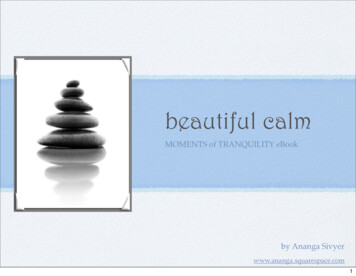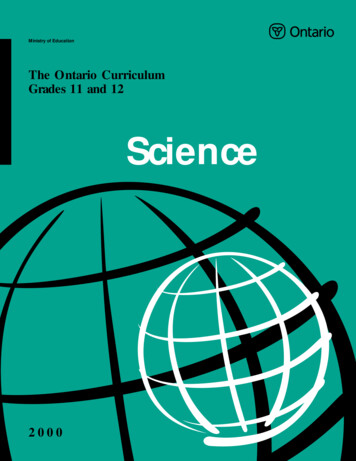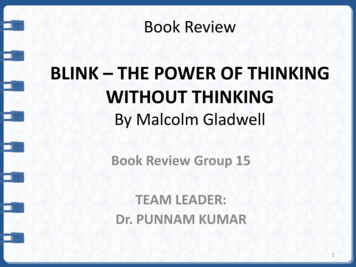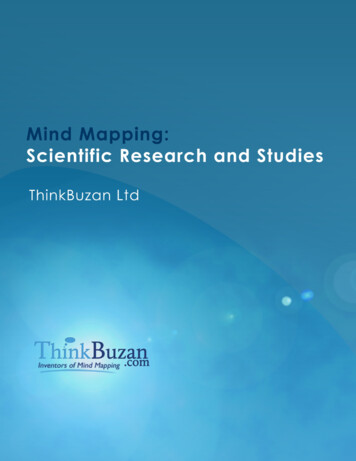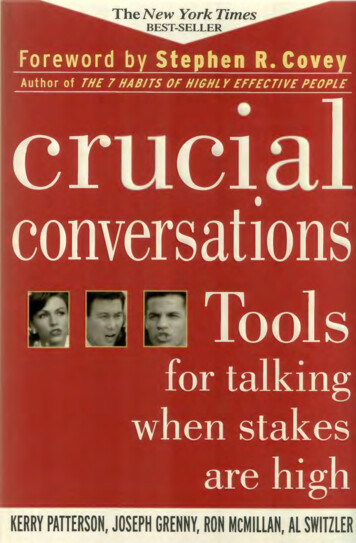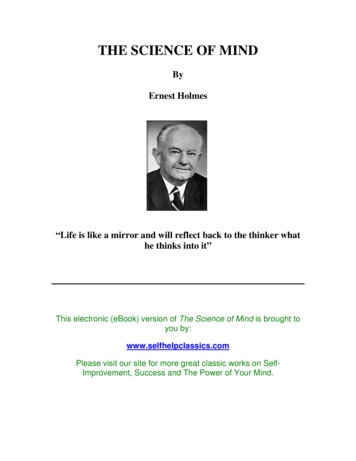
Transcription
THE SCIENCE OF MINDByErnest Holmes“Life is like a mirror and will reflect back to the thinker whathe thinks into it”This electronic (eBook) version of The Science of Mind is brought toyou by:www.selfhelpclassics.comPlease visit our site for more great classic works on SelfImprovement, Success and The Power of Your Mind.
PEACE BE UNTO THEE, STRANGERPeace be unto thee, stranger, enter and be not afraid.I have left the gate open and thou art welcome to my home.There is room in my house for all.I have swept the hearth and lighted the fire.The room is warm and cheerful and you will find comfort and rest within.The table is laid and the fruits of Life are spread before thee.The wine is here also, it sparkles in the light.I have set a chair for you where the sunbeams dance through the shade.Sit and rest and refresh your soul.Eat of the fruit and drink the wine.All, all is yours, and you are welcome.
FOREWORDIn presenting these lessons on Mental Science, I do not claim to havediscovered any new Truth. The Truth has been known in every age by a few;but the great mass of people has never even dreamed that we live in a mentaland spiritual world. To-day, however, there is a great inquiry into the deepermeaning of life because the race has reached a state of unfoldment where abroader scope is possible.These lessons are an attempt to put into the spoken word and into print some ofthose great truths known to the enlightened of all ages.To suppose that the Creative Intelligence of the world would create man inbondage and leave him bound would be to dishonor that Creative Power whichwe call God. On the other hand, to suppose that God could make man as anindividual, without leaving him to discover himself, would be to suppose animpossibility. Individuality must be spontaneous and can never be automatic.The seed of freedom must be hid within the shell of the human. But, like theProdigal of old, man must make the great discovery for himself. Although thejourney may at times seem hard and the burden too great to bear, man still feelswithin a subtle sense, a mystical presence, a divine Reality. Thus, the inherentnature of himself is forever seeking to express itself in terms of freedom. Wewill do well to listen to this inner voice, for it tells us of a life wonderful in itsscope, of a love beyond our fondest dreams, of a freedom which the soulcraves.But the great love of the universe must be one with the great law of Its ownBeing, and we must approach love through the law.This, then, is the teaching, Love and Law. As the love of God is perfect, so thelaw of God is also perfect. We must understand both. "Who hath ears to hear,let him hear."I wish to express my appreciation to the authors whose names are mentionedfollowing the different lessons in this course of instruction, as well as to manyothers whose names are not mentioned. The Truth comes to us from all sources,and our understanding of it is the result of the time, thought and effort ofthousands of people who have given their lives to its study.I wish to express special appreciation to Miss Anne Shipman, of Boston, Mass.,without whose untiring efforts it is not probable that these manuscripts wouldhave ever been gotten in shape for publication; and to my mother whose great
faith in these teachings has inspired me with the hope and the belief that theymay be of benefit to those who study them.THE SCIENCE OF MIND YOURSELFOh, weary heart, laden with earth's weight and care,Oh, feet, stumbling on the way, bleeding and bare,Oh, arms outstretched, and hands upheld in prayer,Oh, back, which so oft has felt the lash and rod,Oh, soul, which cries aloud for the living God,Oh, life, struggling to free itself from the clod;Know this: there is no power from without,Yourself must answer every fear and meet all doubtWith some divine, indwelling powerWhich you yourself, upon yourself, shall shower;And giving, take, and taking, giveUnto that life which you, yourself, shall live.
Part I: The Evolution of Man's ThoughtINSTINCTIVE MANIf we traced man's history back into the dim past we should come to a placewhere he did not consciously know himself. We should come to a place whereInstinctive Man alone existed; for the self-conscious man had not yet evolved.Nothing can be more apparent than that man, as he now appears, is the result ofgrowth and unfoldment. But in order to unfold, he had to have something fromwhich to unfold, and since he is intelligent, he must have unfolded from anintelligent cause.Instinctive Man, then, means that Inner Something, or Life, which we do notsee but which is, of course, there. We might say that Instinctive Life is God inman, or the idea of God, working through man. But if Instinctive Man is anidea of God, why is he not perfect? The answer is that he is perfect, but that assoon as individuality is evolved he must be left alone to discover himself. EvenGod could not make a mechanical Individuality. If man is created with theattributes of self-choice and free will, he must be let alone to make the greatdiscovery for himself.NATURE WAITS ON MAN'S SELF-RECOGNITIONWe note, that from the day when Instinctive Life brought man to the point ofself-choice, it let him alone, and from that day Instinctive Life has waited onman's unfoldment. It is true that during all this time it has carried on theautomatic functions of the body and has even silently told man what todo; but it has let him alone in all other ways. It may, and must, hold man as aperfect being, but it also must let him discover this fact for himself. During allof this time, however, Instinctive Life, or God, must be silently waiting for thegreat discovery to be made and must always be ready to respond to man'sadvancement. We note this to be true along the line of man's progress. Forinstance, consider the discovery of any of nature's forces; we know that theymust have always existed; but, so far as man is concerned, they exist to himonly after he has discovered, and learned how to make use of them. Electricitywas a reality in the universe when Moses led the Children of Israel from theland of Egypt, but neither Moses nor any of his followers knew anything aboutit, and so they did not receive any benefits from its use. This is true of any andall of the natural laws; they always existed, and as soon as understood may be
used. In this way, Instinctive Life waits upon man's discovery of the naturallaws and his discovery of himself and his relationship to the great Whole.If this is so evidently true of all the forces in the natural world we must expectto find the same thing to be true of those inner and finer forces within man. Theunfoldment of these inner and finer forces through man is what we call hisevolution.THE FIRST GREAT DISCOVERYThe first great discovery that man made was that he could think. This was theday when he rose from the ground and said, "I AM." This marked the first greatday of personal attainment; and from that day man became an individual andhad to make all further progress himself; any compulsory evolution stoppedwhen man became an individual, and from that day he had to work in consciousunion with Nature and Her forces; but he did not have to work alone, forInstinctive Life has always been with him and will never depart from him.Instinctive Life desires that man shall express more, and yet more, of its ownlimitless possibilities.Man is evolving from an Infinite basis; behind him is the great Unknown butnot the great unknowable; for the unknown becomes known through man, andwhatever more Instinctive Life is to do for him must be done through him.Nature must work through man in order to work for him. This is true all alongthe line of life and endeavor.The first great discovery of man was that he could think, plan and execute. Asthe result of this discovery he has built up a great civilization and all that goeswith it. He has harnessed electricity to his inventions, tied steam and compelledit to do his bidding. He has laid waste forests, built cities, made the desert tobloom, and has thrown the lines of his commerce around the globe; indeed, hehas seemed to possess the earth.THE INNER SENSE AWAKENSBut with all of man's powers he has still felt a vague sense of something more,something greater, something further along; a sort of mystical inner sense ofthings, an instinctive urge, a blind groping after a greater light. Disregarding allof his apparent power, man has still been unhappy, sick, lonely and afraid. Thecities which he built have crumbled into dust, the nations which he fosteredhave, one by one, fallen into ruin, and history alone remains to tell the tale ofmost of his endeavors.
In spite of man's apparent power he has suffered greatly, and death hascrowned his life and work with a pall of darkness and uncertainty.THE GREAT QUESTION "WHY"The great question "Why" has forever been upon his lips. Few indeed havebeen able to answer this question; and these few have been passed by,unheeded, in the struggle for existence.Man has struggled along the weary road with a heavy heart and bleeding feet,only to be met by the grave. The lack of a sense of completion has beset hisevery pathway; and in his blind groping he has held up his hands in speechlessanguish, and his broken cries have rent the air with supplications to anapparently unheeding Deity.Why the suffering, the sorrow, the sin, the sickness and a lifetime of trouble,only to be met at last by the grim and sinister tomb?Why, why, why? Man has sought the wise only to discover their foolishness; hehas sought the learned only to find a lack of wisdom. Why, why, why? His cryhas appeared to go forth into an empty nothingness. But hark! from somewherea vague answer has come, some subtle inner sense of things; some unknownpresence has given answer and a still small voice has said to him, "Man, knowthyself." The Instinctive Man has again spoken and told him to search moredeeply into his own nature; to look deep within himself for the answer to life.The hour has struck in the evolution of man when he can understand this voiceand do its bidding.THE GREATEST DISCOVERY OF ALL TIME—MINDMan's response to this inner Instinctive Voice has caused him to start on thegreatest adventure of his career, the discovery of Mind.Man's first discovery of his ability to think was set aside as being too evident totake any notice of; he could think, but what of it! Of course, it was a proof thathe was, but that was all; he had always been able to think; this simply gave himthe ability to know his needs and try to supply them. This he had always done.The ability to think seemed to be an automatic thing; it came with him andwould doubtless die when he died; the brain seemed to be the organ of thought;and, of course, when death stilled the brain it would no longer operate—thiswas self-evident.
THE BRAIN DOES NOT THINKBut the day came when some wise man said that it is not the brain that thinks atall; for if the brain, of itself, could think, then one could cut it out and it wouldkeep right on thinking.No, the brain of itself could not think; and yet, without a brain man could notthink; which simply means that man needs a brain while here, but that thebrain, of itself, does not think. The brain does not think and yet man thinks; sobehind the brain there must be a thinker. But where is this thinker? We do notsee him. Have we a right to say that there is a thinker when no one has everseen him? Yes; for can we name a single force of nature that we can see? Havewe ever seen electricity or any of the other forces of nature? No; and the onlyevidence we have of their existence is that we see what they do. We have lightand motive power, so we have a right to suppose that there is a force which wecall electricity. This is true all along the line, for we see effects and not causes.WE DO NOT SEE THE THINKERBut to return to the thinker; we do not see him, but the proof of his reality is inthe evidence of his works. We know that the legs do not walk; for, if severedfrom the body, they could not carry any one very far. Cut off the hand and seeif it could still hold anything in its grasp! Pluck out the eye and it cannot see;and so it is with all the organs of the body. There is a thinker and doer back ofthe organism who is using it for a conscious purpose.THE BODY UNCONSCIOUS WITHOUT THE THINKERThis is a great discovery; for it means that the body without the thinker couldneither be sick nor suffer; for without the thinker there could be no movementof the body. Why then are we sick? This inquiry will not be answered untilevery form of disease is swept from the face of the earth and numbered with thethings that were once thought necessary. For man has discovered that the body,of itself, has no life nor power to act.Let us follow the course of man's thought since he first made this discoveryabout the body and began to apply his knowledge. He first realized thatInstinctive Man built up the body through evolution; and, after having createdand evolved a perfect body, left it in man's keeping to do with as he willed. Atfirst, man was ignorant of this, thinking that the body was self-operating; but assoon as he discovered that such was not the case he began to formulate certainnew theories about himself. He discovered that while he could consciouslythink and decide, something happened to his thoughts after he had thought
them. They went somewhere; for soon they would come back as remembrance.Man had now discovered that he could consciously think and that his thoughtwould come back to him again. This led to the conclusion that memory is anactive thing, an inner mental action. He said, "Memory is the storehouse of allmy conscious thoughts and it is active. My body is not conscious of life, but mythought is conscious of my body; my body is operated upon by my thought; andit must also be operated upon by my memory, since memory is active. But,since memory is only the result of conscious thought, memory, of itself, is anunconscious operation of what was once a conscious thought."THE CONSCIOUS AND THE UNCONSCIOUS THOUGHTSince man always has had the habit of naming things, he named his memoryhis "unconscious thought," and his conscious thought he called his "objectivemind." He now came to the conclusion that he had two minds, one consciousand one unconscious, or sub-conscious. The conscious mind being the one thathe used all of the time in his self-conscious state and the sub-conscious mindbeing the storehouse of all his conscious thoughts, as well as the seat of hismemory. It follows, that as conscious thought acts, unconscious thought mustalso operate. This conclusion led to the discovery that the sub-conscious mindis the builder of the body; not that it really made the body in the first place, forInstinctive Man did that; but that the sub-conscious mind keeps the body goingand is always acting on the thoughts of the conscious mind. After carefullywatching this process, man discovered that he could consciously think and, byso doing, make such an impression on his unconscious thought that it would dowhat he directed. From these observations he deduced the law of suggestion tobe one of action and reaction. Thus he found how habits are formed; that theyare conscious ideas fallen into the inner thought and carried out to logicalconclusions.A NEW BASIS OF THOUGHTTherefore, he began to reason: "Instinctive Man within me is perfect and yet Iappear to be imperfect. My apparent imperfection must be the result of animperfect thinking; in reality I am, and always have been, perfect. I will nowbegin to think differently about myself and see what happens." And as he beganto think from the new basis he found that the body responded and was healed.So he came to this conclusion: "God made me perfect but He also made me anindividual, which means that I can do with myself as I will. I cannot reallydestroy my body but I can make it most uncomfortable. Since God made meand made me perfect, each one of the organs of my body represents a perfectidea."
Realizing this to be true, he began to think from this basis, and the organs of thebody responded. He found that thoughts of peace produced a peaceful conditionwhile thoughts of fear produced a disturbed condition; that confidence madehim strong while fear made him weak. In fact, he was able to trace each mentalattitude to its physical correspondent. He discovered that, asleep or awake, theinner mind works all the time. He also found that by analyzing his thought hecould discover what ailed him. This he called psycho-analysis.THE LAW OF MINDThen another idea came to him: the whole thing was in accordance with law.He had discovered a law of mind just as he, at another time, discovered a law ofelectricity. If it were law, then he could always use it and it would alwaysrespond. From this he gradually built up a definite technique for the practice ofright thinking.He found that if he always thought of himself as being perfect he would alwaysfeel better. But what should he do with his body when it appeared sick? Howwas he to think of himself when he was sick? Could he deny that he was sickwhen he was suffering? Yes; for his sickness was the result of thought, and bychanging the thought he could change the effect. He learned to turn away fromthe body when it was sick and go back into mind and think of the body as beingperfect; for his thought worked independently of the body. He turned from theimage of sickness to the idea of health and said, "I am perfect, no matter whatthe appearance may be."UNCONSCIOUS MIND AT WORKBut some kinds of sickness had never entered his mind at all; that is, he hadnever consciously thought of them. How was he to reconcile this fact with hisnew theory? For a while this was a hard problem to solve; but by a still morecareful study of his inner self, he discovered that what he called his subjectivemind took all of his thoughts and did something with them. He found that therewere certain combinations of thought which, brought to their logicalconclusions, would produce certain kinds of diseases. He did not have toconsciously think of a certain disease to have it; but if he thought certain kindsof thoughts they would produce their logical results. For instance, if he wereexcited all the time it would produce nervousness; if he became angry it wouldsecrete poison in his system, and so on through the whole category of thehuman ailments; somewhere in mind they had their reason for being. Perhapshe could not always tell exactly where, but, by knowing that his body wasperfect, he could still heal himself. He knew that as time went on and his
knowledge grew he would find out more and more about himself and so bebetter able to heal himself. He was glad that he had started on the right track; hebelieved that he would know all in time and never be sick again.ANOTHER GREAT DISCOVERY—THOUGHT REACHED OTHERSThen a new discovery came, which was that he could think of others and healthem. It seemed to make no difference where they were; he could think of themand heal them. This was a most astounding fact, for it meant that there was acommon mind somewhere through which his thought operated; for he could notreach another unless there were a medium between himself and the otherperson. This seemed strange; for what he had learned to think of as hisindividual subjective mind, was, after all, only the personal use that he wasmaking of something which was around every one. He began to think forothers, and found that mind responded to his thinking for them and causedsome action to take place in their bodies. He called this medium "UniversalMind," or "the Law of God." It seemed to be as omnipresent as the law ofelectricity or any of the other forces of nature.THE DISCOVERY OF RACE-THOUGHTIn this way he discovered how it was possible that the whole race might haveheld certain kinds of thoughts and how they might have operated through anyone who was receptive to them. That is, if any one should feel discouraged,other thoughts of discouragement might gain entrance also and make him feelworse. This he called race-suggestion. But how was he to protect himself fromit? By knowing that it could not operate through him; that he was a perfect ideaand could not be affected by suggestion; for, after all, it was nothing butthought. He learned to build a mental wall around himself which could not beentered unless he chose. This he called "Divine Protection."A UNIVERSAL MEDIUM WHICH ALL MUST COME TO BELIEVE INMan had now discovered that he could help and heal himself and others bythinking into some kind of a Universal Law of Mind. He found that, like allother forces of nature, it was a great Impersonal Law and could be consciouslyused whenever he wished to use It and that the use of It was through rightthinking. He realized that the time must come when the race would be healedby knowing the Truth about itself. But because the Law was mental it couldonly work for those who believed in It, and since many did not believe, thething to do was to heal himself and others who wished to be healed, waiting forthe rest of the world to realize the fact.
ANOTHER QUESTION COMES UP—WHY ARE PEOPLE POOR?But another thought came to him. If he could think into some kind of aUniversal Medium of Mind and heal himself and others; if this Mind couldproduce such a physical effect on the body, why could it not also produce thesame kind of an effect on conditions and the affairs of life? Why was it thatsome were rich and some poor? Was this fate, or was it because there was notenough for all? If the One Mind made bodies, why did It not also createconditions? And if It did, why did it not give to all alike?Why were some people happy and prosperous and others unhappy, weak andpoor? Could the answer to this also be in Mind? Could it be that just as manhad thought of himself as sick, and so made sickness, he had thought of povertyand made this condition possible in his experience?Questions like these and many others came into the mind of man and causedhim to search even more deeply into the nature of things. Looking about, hesaw some succeed and some fail, though all was taking place in the same worldand under common conditions. So he knew that it must be something in man,and not outside of him, that made all these things possible. He realized thatconditions did not make themselves. Everything in man's life was run by manhimself.MAN BEGINS TO REALIZE THAT HIS CONDITIONS ARE CONTROLLED BY THOUGHTIn this way man realized that even his affairs were controlled by thoughtworking through the avenue of the One Mind. He discovered that by changinghis thought he could remold his affairs, and that by right thinking he couldbring into his life new conditions. But would there be enough to go aroundshould every one become prosperous? Yes, for Instinctive Life is Limitless.REALIZES THAT HE MUST THINK CORRECTLYSo man discovered that he could control his affairs by right thinking; he couldbring into his experience the things he wished to enjoy if he thought correctly;and since this was all in accordance with law he could do so consciously. Herealized that the time would come when every one would think correctly; andpoverty, unhappiness, and all that goes with them, would be swept from theface of the earth. They were never intended to be, but man had misused hispower; now that he understood, he would change his whole manner of thinkingand consequently he would become happy and have plenty. But every one didnot believe this. Many said that it was a foolish idea, while others said that itwas too good to be true. However, it was soon proven that whoever would
believe and comply with the Law could prove it to be true. If some did not wishto believe, that was all right; there were plenty who would, and the directproofs of their lives would in time convince others. In this way, eventually, allwould be saved from unbearable conditions. The thing to do was to teach theLaw to those who did believe.And so the lessons which follow are for this purpose, to teach those whobelieve in the Law how to use It.The race is made up of individuals, and the place to begin is with the personwho believes in the greater possibility. Each one, for himself, must work outthe law of his own being. It is within the power of every man to completelychange his environment and completely heal his body. Whether or not he willdo this depends entirely upon his own conviction and his own determination.Nature attends him on the way and is always ready to serve; but he is anindividual and nothing will ever be forced upon him. Let any one follow theLaw, comply with Its nature, and consistently apply himself to right thinkingand living, and he will prove to himself that life holds all and more than he hasever imagined.
Part II: The LessonsLesson One: IntroductionIn presenting these lessons in Mental Science to the public, it is my desire tomake it possible for any one, who cares to take the time to study them, todemonstrate the truths that will be discussed. It is, perhaps, hard to set down inwriting a complete teaching in Mental Science that will not appear difficult tounderstand; but this could be said as well of any science, and the Science ofMind is no exception to the general rule.SCIENCEScience is knowledge of facts built around some proven principle. All that weknow about any science is that certain things happen under certain conditions.Take electricity as an example; we know that there is such a thing as electricity;we have never seen it, but we know that it exists because we can use it; weknow that it operates in a certain way and we have discovered the way it works.From this knowledge we go ahead and deduce certain facts about electricity;and, applying them to the general principle, we receive definite results. No onehas ever seen the power or the energy that we call electricity; and the onlyproof we have that it really exists is that from it we receive light, heat andmotive power.No one has ever seen any of the great causes that lie back of the manifestationsof life, and perhaps no one ever will; but we know that such principles existbecause we can use them.HOW LAWS ARE DISCOVEREDThe discovery of a law is generally made more or less by accident, or by someone who, after careful thought and observation, has come to the conclusion thatsuch a principle must exist. As soon as a law is discovered experiments aremade with it, certain facts are proved to be true, and in this way a science isgradually formulated; for any science consists of the number of known factsabout any given principle. As more and more facts are gathered and proven, thescience expands and gradually becomes accepted by all and used by those whounderstand it. In this way all of our sciences have been evolved until to-day wehave the use of powers and unseen forces of which our ancestors never evendreamed.
PROOF OF MINDThis is true of the Science of Mind. No one has ever seen Mind or Spirit, butwho could possibly doubt their existence? Nothing is more self- evident thanthat we live; and since we live, we must have life; yet who has ever seen thislife? The only proof of life we have is that we live; and the only proof we haveof Mind is that we can think; so we are perfectly justified in believing that wehave a mind and that we live.WHERE OUR THOUGHTS GOAs we watch the processes of thought we find that we think consciously, andwe also find that something happens to our thoughts after we have thoughtthem; for instance, they become memory. This proves that we have a deeperaspect of mind, which is called subjective, lying just below the threshold of theconscious. This subjective mind is the place where our thoughts go and fromwhence they eventually return to us again as memory. Observation proves thisto be true; for it always happens this way.Observation has proven that the subjective mind is the seat of memory and thatit contains mental pictures, or impressions, of all that has ever happened to theindividual. As these mental impressions come to the surface of the consciousmind they are called memories.Moreover observation has shown that the subjective mind is the builder of thebody. It has proven that it is not only the seat of memory; it is also the avenuethrough which InstinctiveMan works. We mean by Instinctive Man that part of the individual whichcame with him when he was born—that inner something which makes himwhat he is. For instance, we do not have to consciously think to make the bodyfunction; so we say that the inner, or the Instinctive, Man, does this for us. Thisis true of most of the functions of the body; they appear to be automatic; theycame with us and are nature's way of working through us. So we say that in theunconscious or the sub-conscious or the subjective, there is a silent processforever working away and always doing its duty, carrying on all of theunconscious activities of the body without effort on our part.SUGGESTION BECOMES MEMORYIt has been observed that suggestions, planted in the subconscious, becomememories, and eventually tend to externalize in the body. From this it has beendeduced that the sub-conscious mind is the builder of the body and is the
creative factor in man. It has also been proven that certain types of thoughtproduce certain kinds of results. This shows that the subjective mind takes oursuggestions and tends to act upon them, no matter what the suggestion may be.While the Instinctive Man, or the Natural Man, must be perfect, it is known thatthe thoughts of the conscious man may hinder instinctive action, throughadverse suggestion. That is, conscious thought, acting as memory, may build afalse condition in the body, which condition we call disease. Conscious thoughtmay also erase this memory and thereby heal the disease.Through observations such as these, a science of the subjective mind hasgradually been form
THE SCIENCE OF MIND YOURSELF Oh, weary heart, laden with earth's weight and care, Oh, feet, stumbling on the way, bleeding and bare, Oh, arms outstretched, and hands upheld in prayer, Oh, back, which so oft has felt the lash and rod, Oh, soul, which cries aloud for the living

